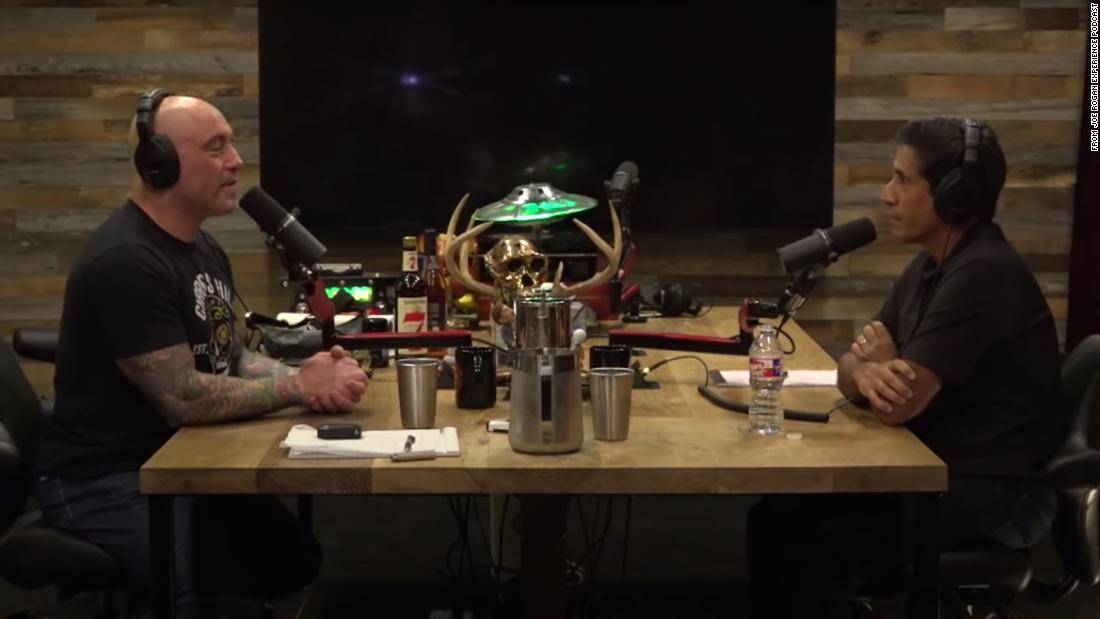The two talked for more than three hours with no cellphones, no distractions and no breaks. Here’s what they covered.
I don’t think I have ever had a conversation that long with anyone. Seriously — think about that. We sat in a windowless podcast booth with two sets of headphones and microphones, and a few feet between us. Not a single interruption. No cellphones. No distractions. No bathroom breaks.
At a time when there is a desire for shorter, crisper content — responding to abbreviated human attention spans — one of the most popular podcasts in the country features conversations that last exceptionally long and go particularly deep.
OK, I am embellishing here, but Joe Rogan is the one guy in the country I wanted to exchange views with in a real dialogue — one that could potentially be among the most important conversations of this entire pandemic. After listening to his podcasts for a while now, I wanted to know: Was Joe simply a sower of doubt, a creator of chaos? Or was there something more? Was he asking questions that begged to be asked, fueled by necessary suspicion and skepticism?
Into the lion’s den
It wasn’t what Joe Rogan thinks that most interested me, it was how he thinks. That is what I really wanted to understand.
Truth is, I have always been a naturally skeptical person myself. One of my personal heroes, the physicist Edwin Hubble, said a scientist has a “healthy skepticism, suspended judgment and disciplined imagination, not only about other people’s ideas but also about their own.”
It’s a good way of thinking about the world — full of honesty and humility. I live by that, and I think Joe may to some extent as well. He will be the first to point out that he is not a doctor or a scientist who has studied these topics. Instead, he seems to see himself less a rapscallion and more of a sort of guardian of the galaxy, pointing out the missteps made by large institutions such as the government and mainstream medicine, and then wondering aloud if they can still be trusted to make recommendations or even mandates for the rest of us. To many, he represents a queen bee in a hive mind, advancing free will and personal liberty above all else.
The free will of your fist ends where my nose begins
When I said this to Joe, the MMA fighter, he paused, sat back and listened for a while. I asked him: Is it not possible to advocate strongly for personal freedoms, but also recognize the unique threat a highly contagious disease represents? He seemed to agree, but then quickly countered with a common misconception about the overall utility of the vaccines.
If vaccinated people transmit just as much as the unvaccinated, why are they really necessary?
Vaccines are not perfect, but he had to agree they are certainly a worthy tool to help control the spread of the virus. And, they are particularly effective at keeping people from getting severely ill or dying. They also may help prevent the development of long Covid, a chronic state of illness that some people develop after natural infection, even if their bout with the acute phase of infection was mild.
What he said next surprised me
So, it turns out that Joe Rogan nearly got vaccinated. That was a headline. It was a few months ago when he was in Las Vegas. He had an appointment scheduled but had logistical hurdles and couldn’t make it. He offered up this story as proof he is not necessarily “anti-vaccine,” even if he does consistently raise issues questioning their legitimacy.
It’s this sort of back and forth that makes it hard to pin Joe Rogan down, both in martial arts and a podcast interview.
Despite a downplaying of Covid risks often heard on Joe’s podcast, his private studio prioritizes safety. A nurse was present to perform a rapid Covid test before we began. We were even checked for the presence of antibodies with a finger prick blood test.
The nuance of immunity
So the question Joe raises, as do many others: Why should those who have previously had Covid still get the vaccine?
Another issue with natural immunity is that it can vary substantially based on the age of the individual and just how sick they got in the first place. Milder illness in older people often resulted in fewer antibodies being produced.
![]()


